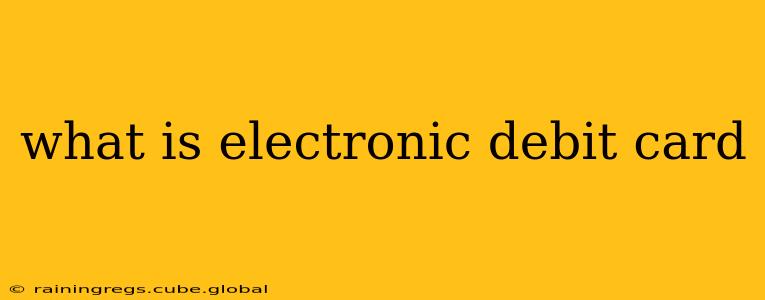An electronic debit card, often simply called a debit card, is a plastic card that allows you to access your bank account funds electronically to make purchases or withdraw cash. Unlike credit cards, which provide a line of credit you borrow against, debit cards directly deduct money from your checking or savings account at the time of transaction. This means you can only spend the money you already have in your account. Think of it as a portable version of your bank account, offering a convenient and secure way to manage your finances.
How Does an Electronic Debit Card Work?
The process is straightforward:
- Transaction Initiation: When you use your debit card to make a purchase, you insert or tap it at the point-of-sale (POS) terminal.
- Authorization: Your bank verifies that you have sufficient funds in your account to cover the purchase.
- Funds Transfer: If authorized, the transaction amount is immediately deducted from your bank account and transferred to the merchant's account.
- Receipt: You receive a receipt confirming the transaction, showing the date, time, amount, and location of the purchase.
This entire process typically happens in seconds, making debit cards a highly efficient payment method.
What are the Different Types of Debit Cards?
Debit cards come in various forms, offering different features and benefits:
- Standard Debit Cards: These are the most common type, offering basic debit card functionality.
- Debit Cards with Rewards Programs: Some banks offer debit cards that provide cashback, points, or other rewards for purchases.
- Prepaid Debit Cards: These cards require you to load funds onto them beforehand. They're popular for budgeting and controlling spending.
- Virtual Debit Cards: These are digital debit cards that can be used for online purchases and are linked to your bank account. They offer an added layer of security compared to using your physical card online.
What are the Advantages of Using an Electronic Debit Card?
- Convenience: Debit cards are widely accepted, making it easy to make purchases almost anywhere.
- Security: Debit cards offer a relatively secure way to pay, particularly when using features like EMV chip technology and online fraud protection.
- Budgeting: Using a debit card helps you stay within your budget because you can only spend the money you have.
- No Interest Charges: Unlike credit cards, debit cards don't accrue interest charges.
- Easy Access to Funds: You can easily access your money through ATMs using your debit card.
What are the Disadvantages of Using an Electronic Debit Card?
- Overdraft Fees: If you attempt to spend more than you have in your account, you may incur overdraft fees.
- Limited Credit History: Using a debit card does not build your credit history, unlike using a credit card responsibly.
- Liability for Unauthorized Use: While debit cards offer protection against unauthorized transactions, there can be a waiting period and potential liability before the issue is resolved.
- Lower Purchase Protection: Compared to credit cards, debit cards may offer less robust purchase protection against damaged or faulty goods.
Are Debit Cards Safe?
Debit cards are generally safe, but it's crucial to practice good security habits:
- Protect your PIN: Never share your PIN with anyone.
- Monitor your account: Regularly check your bank statements for unauthorized transactions.
- Report lost or stolen cards immediately: Contact your bank to cancel your card as soon as possible if it's lost or stolen.
- Use secure online payment methods: When shopping online, use reputable websites and secure payment gateways.
What is the Difference Between a Debit Card and a Credit Card?
The key difference lies in how they work: debit cards deduct money directly from your bank account, while credit cards extend a line of credit that you pay back later. Credit cards build credit history, while debit cards don't. Credit cards often have higher purchase protections and rewards programs than debit cards.
How Can I Get an Electronic Debit Card?
Most banks offer debit cards to their customers. You can typically request one when opening a checking or savings account.
This comprehensive guide provides a thorough understanding of electronic debit cards, addressing their functionality, advantages, disadvantages, and security considerations. Remember to always practice safe usage habits to protect your finances.
